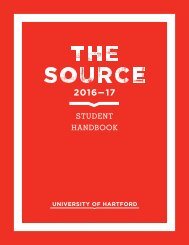advising
Create successful ePaper yourself
Turn your PDF publications into a flip-book with our unique Google optimized e-Paper software.
COLLEGE OF ENGINEERING, TECHNOLOGY, AND ARCHITECTURE<br />
Advising Information: 860.768.4446<br />
Course Descriptions<br />
AET 110 Introduction to the Architectural Process [4]<br />
This course focuses on integrating lectures and studio classes<br />
to develop students’ understanding of the methods, media, and<br />
materials used in the communication of design. Students practice<br />
graphic and verbal presentation techniques. Construction techniques<br />
in relation to construction documents, including plans, elevations,<br />
sections, details, and specifications are presented. Two lecture hours,<br />
six lab hours. Laboratory fee.<br />
AET 112 Introduction to the Built Environment I [1]<br />
The course introduces students to the multi-faceted built<br />
environment. Topics include: the roles of the architect, engineer,<br />
contractor; the design-construction process; the variety of fields<br />
related to the built environment; the integrated nature of design/<br />
engineering/construction; and the global context of architecture.<br />
In addition students will understand and develop working<br />
approaches to the procedures and processes of higher learning and<br />
professionalism. One lecture hour.<br />
AET 123 Architectural Design I [4]<br />
An introductory course with an emphasis on the architectural<br />
responses to people’s basic needs for shelter. At the fundamental<br />
level, these needs—physical, psychological, sensual, intellectual,<br />
cultural, and aesthetic—are met through physical design. Emphasis<br />
is placed on problem solving through studio activity and on relating<br />
architectural theory and criticism to the studio. Two lecture hours,<br />
six lab hours. Laboratory fee.<br />
AET 155 Ancient through Renaissance Architecture [4]<br />
This course examines the roots of the Western architectural<br />
tradition, starting with the prehistoric and primitive developments<br />
in Europe and the ancient Near East, and continuing through<br />
Egypt, Greece, Rome, Byzantium, and Western Europe through<br />
the Renaissance period. An understanding of Ancient, Classical,<br />
Medieval, and Renaissance styles is developed through lectures,<br />
slides, videos, and sketching. Four lecture hours.<br />
AET 156 19th- and 20th-Century Architecture [4]<br />
This course examines the roots of the contemporary Western<br />
architectural tradition, from the early 19th century through the late<br />
20th century. An understanding of Neoclassical, Industrial, Arts<br />
and Crafts, Art Nouveau, Art Deco, Modern, Postmodern, and<br />
Neomodern styles is developed through lectures, slides, videos, and<br />
sketching. Four lecture hours. Prerequisite: AET 155 or permission<br />
of instructor or chair.<br />
AET 160 Architecture Studio Shop Operations and Safety [1]<br />
This course provides students with the necessary operational<br />
and safety procedures for various shop tools and equipment.<br />
Prerequisite(s): Matriculation in AET or M.Arch. degree programs.<br />
Laboratory fee.<br />
underlying structure, learn to sight-sing simple musical pieces, and<br />
learn to use computer software to manipulate music electronically.<br />
Three contact hours.<br />
AUD 111 Music for Audio Technologists II [2]<br />
This course continues the coverage of basic music theory as needed<br />
by audio engineering technologists. The emphasis is on development<br />
of listening skills as well as basic performance skills. Besides music<br />
theory, students gain an appreciation of classical and contemporary<br />
music and its underlying structure, learn to sight-sing simple musical<br />
pieces, and learn to use computer software to manipulate music<br />
electronically. Three contact hours.<br />
AUD 122 Audio Recording Principles [2]<br />
This course introduces first-year students to the use, operation, and<br />
maintenance of a modern recording studio. Fundamental concepts<br />
found in audio recording are presented along with several projects<br />
based in the recording studio. Microphone usage, mixing-board<br />
operation, digital tape recording, and the digital audio workstation<br />
are investigated.<br />
AUD 161 Modern Recording Techniques for Engineering<br />
Technology [3]<br />
Design, setup, use, and management of a modern recording studio.<br />
Focus on analog and digital recording techniques. Emphasis on<br />
practical studio use with hands-on recording and mixing of live<br />
music. Prerequisites: AUD 110 and AUD 122, or permission<br />
of instructor.<br />
CS 111 Programming Foundations [3]<br />
An introductory computer programming course designed for<br />
students with no prior programming background. Emphasis will<br />
be placed on problem solving and the translation of solutions<br />
into a programming language. Topics include data types, input/<br />
output, control structures, loop structures, and program modularity.<br />
This course may be used to prepare the student with no prior<br />
programming experience for CS 114 or as a one-semester exposure<br />
to programming. Prerequisites: (1) Two years of high school algebra<br />
with an average grade of at least B and (2) a high school computer<br />
course or CS 110. Not open to students who have completed a<br />
higher level CS course. Laboratory fee.<br />
ECT 110 Practical Projects [3]<br />
Introduction to the fundamentals of electronics and computer<br />
engineering technology with emphasis on skills that are needed<br />
for the major. Students undertake practice-oriented group lessons<br />
in topics such as soldering, printed circuit board and electronic/<br />
computers troubleshooting skills. Students are guided to apply the<br />
skills they gained from the above lessons to build electronic gadgets,<br />
and to use robotic kits to perform specific tasks through team<br />
projects. Statistical analysis is covered in this course. Students work<br />
on several projects, including a final project in a team setting. Three<br />
hours of combined lecture/laboratory. Laboratory fee.<br />
AUD 110 Music for Audio Technologists I [2]<br />
This course covers basic music theory as needed by audio engineering<br />
technologists. The emphasis is on development of listening skills<br />
as well as basic performance skills. Besides music theory, students<br />
gain an appreciation of classical and contemporary music and its<br />
35



